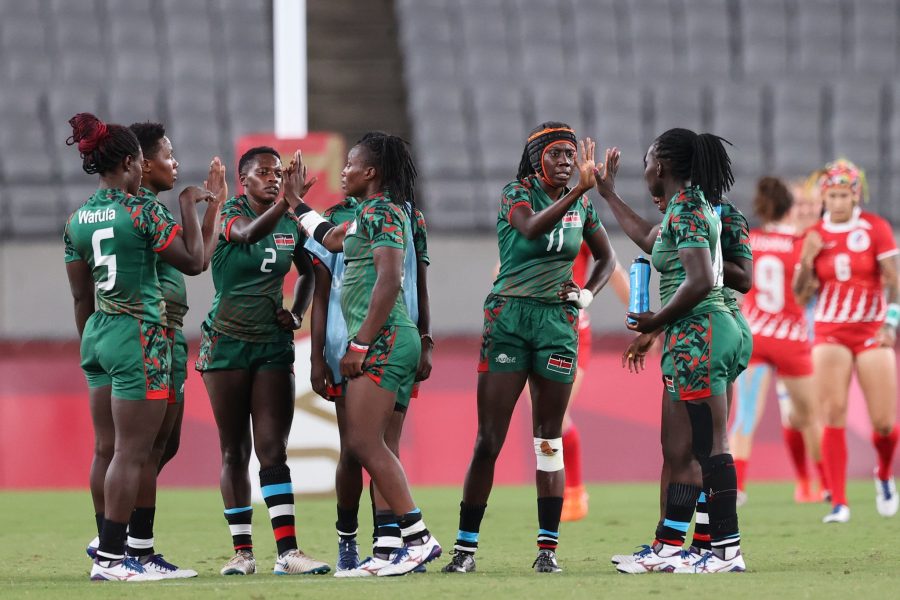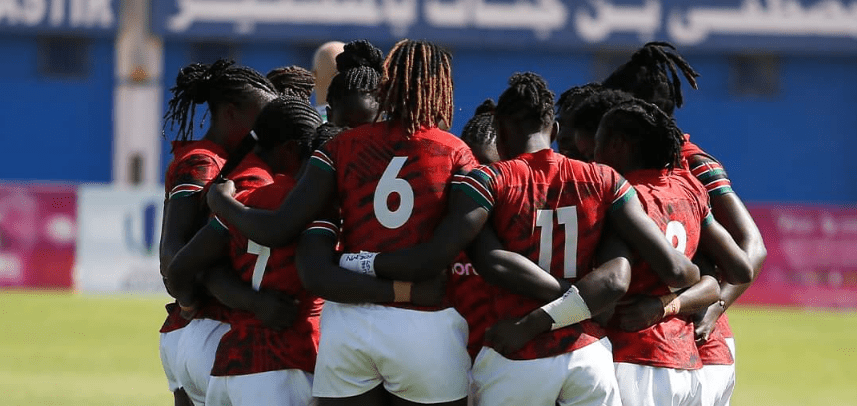In the bustling heart of Nairobi county, amidst the towering skyscrapers, lies a group of determined young women who are the backbone of the Kenya Lionesses, the national women’s rugby team.
Their home base is none other than the RFUEA grounds along Ngong Road. Despite facing numerous challenges both on and off the field, the Lionesses’ resolve remains unyielding as they pursue excellence in the world of rugby.
Kenya Lionesses players battles
For the past eight months, these fierce athletes have been engaged in a relentless battle, not only against their opponents on the rugby pitch but also against the harsh realities of life, including the absence of pay.
Despite proudly representing their country in international competitions, they find themselves grappling with the day-to-day struggles of survival in Kenya’s capital.

Kenya Lionesses in a past Olympic event. Photo Courtesy/World Rugby
Scrummage Africa has learnt the escalating severity of their situation. As of Thursday, April 18, players in training were without food, including breakfast and lunch, due to unpaid suppliers.
Consequently, training sessions had to be postponed, as intense rugby training cannot be conducted on empty stomachs. In response to this dire circumstance, the National Olympic Committee is likely to host the team in Kasarani for camp for around 10 days to ensure they have the resources to continue training.
Furthermore, it has come to light that the technical staff has had to step in at times, contributing their own resources to provide breakfast and lunch for the players when the Union was unable to do so, despite facing similar financial hardships due to unpaid dues.
Tragically, some players who were part of the promising young squad that competed in the Safari 7s tournament have been forced to drop out of the camp due to lack of fare to attend training sessions and the absence of payment for their participation in the tournament.
Even those players who have been provided with accommodation near the training facilities are struggling to obtain food, compounding the challenges they face in pursuing their rugby dreams.
One such player, who has been through the struggles we call ‘Hadija’ to protect her identity from potential victimization, opens up about the daily struggles she faces.
She rises at dawn preparing herself for grueling training sessions that push her to her limits. “I wake up at 5 am ready for training, board a matatu to RFUEA grounds,” she shares.
“We train four days a week, and I spend my transport fare, approximately Ksh.150 daily, just to get to practice,” she adds.
“We are only provided with breakfast and lunch on training days,” Hadija explains.
“Currently, am on the edge. Life has taken a different twist, I am three months behind on paying my rent. The landlord has been patient enough with me, but it’s a constant worry.”
EDITOR’S PICKS:
- David Mayabi’s dual dance
- Follow us on Scrummage Africa FB
- The story of Moreen Muritu
- Bethuel Anami’s unforgettable chapters
One of the most heartbreaking moments for Hadija was when her landlord questioned her inability to afford rent despite seeing her on television representing her country.
“That was a very painful question,” she recalls. “But I had to explain that when I get money, which I can’t promise an exact date, I’ll sort him out in full.”
“Lately, our training sessions have been from 7 am to 2 pm. But it’s been tough. Sometimes, the coaches have had to dip into their own pockets to buy us food. The Union claims they’re broke, and there has been talk of shortening our sessions to just 1-2 hours.
“But here’s the thing: we’re training for the Challenger Series and Olympic qualification. We need proper, full-length sessions to prepare. We’re giving it our all, sacrificing so much, but the Union is really letting us down.
” We’re all fired up, hungry for success, but days like today, when we couldn’t even finish our training, it’s like trying to read a book with missing pages,” she revealed.
“We’ve had to cut back on what the government paid us during the first and second legs of our tournaments. And there are players who have been training consistently but missed out on those trips, so they’re left with nothing to show for it,” she pointed out.
“Some of us have been fortunate enough to have family support, but they expect us to repay them once we start earning from rugby. It’s a tough situation all around. We’re trying to stick together, to support each other, but it’s hard when you can barely support yourself,” she revealed
It’s not just about the financial strain; being a member of the Lionesses also means juggling responsibilities off the field.
Many of the players are mothers, and the pressure to provide for their families adds another layer of complexity to their lives, one wonders how they manage to stay away from their families.
Scrummage Africa delved deeper into the team’s resilience. Speaking with head coach Dennis Mwanja early this week, the man at the helm of the Lionesses talked emphasizes the importance of creating a supportive environment for the players, both on and off the field.
“We focus on building each other up as a team,” he says. “We may not have all the resources, but we have each other’s backs.”
“At the moment there is no formula you can use to motivate the girls and keep them together, but the girls are looking at the bigger picture, they are driven by their vision to achieve something bigger than them, something that can change the landscape of Kenya Lionesses,” Mwanja echoed.
Recently, the rugby governing body Kenya Rugby Union chairman Sasha Mutai announced that the union is broke and the lack of sponsorship for the Kenya Lionesses is the main reason behind the delay in salaries that tally to 8 months.
However, one big task lies ahead of the ladies, the HSBC challenger series. Having finished fifth in the Montevideo series, the Lionesses will travel to Poland next month for the last edition, which will determine their date if they will earn a promotion to HSBC but first, they have to finish top four.
Their tactician Mwanja believes they can do it amidst the financial crisis that has befallen the team.
“The hope we had after Dubai showed we were able to challenge the best from the series. The girls got the belief that they can go to a place they’ve never reached before despite the financial challenges” he added.
“After the Montevideo, we reviewed our performance and we’ve rectified where necessary, I believe they all know what went wrong, and the addition of Chris brown to the technical team, brings a lot of changes that will help us, I can say we are much better psychologically,” Mwanja voiced.
Despite the struggles the players on their part still believe they need to keep pushing to qualify for the series as they believe it can be the game.



